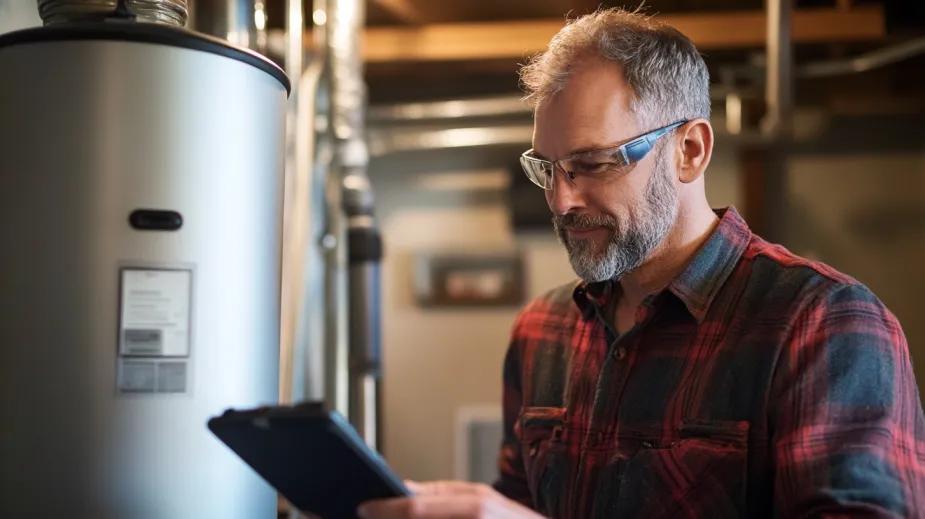The Ultimate Boiler Maintenance Checklist for Homeowners

Like all HVAC systems, boilers need regular care to operate efficiently and last longer. If you don’t keep up with maintenance, you might end up with skyrocketing energy bills, expensive repairs, or even a system failure.
To help you keep your boiler in good shape, HVAC.com has compiled a thorough boiler maintenance checklist. It includes tasks homeowners can do on their own, as well as what to expect during a professional boiler maintenance visit.
DIY Boiler Maintenance Checklist: What Homeowners Can Do
While some aspects of boiler maintenance should always be left to the professionals, there are a few simple things homeowners can do to help keep their systems running smoothly throughout the winter. These steps are easy, safe, and can prevent minor issues from turning into big problems.
1. Check the Pressure
Your boiler relies on the right amount of pressure to work efficiently. If the pressure is too low or too high, it can cause the system to underperform or even shut down. Most boilers have a pressure gauge on the front panel, and the ideal pressure level is typically between 1 and 1.5 bars.
If the pressure is too low, you may need to top up the water using the filling loop. Follow the manufacturer’s instructions to avoid overfilling, which can cause damage. If the pressure keeps dropping, it might indicate a leak, which requires professional attention.
2. Bleed Your Radiators
Air can get trapped in your radiators, causing them to heat unevenly. If you notice cold spots or that some radiators aren’t heating up as they should, it’s time to bleed them. Turn off the boiler system and use a radiator key to release the trapped air, allowing hot water to flow freely again. Set a bowl below the bleed valve to catch any dripping water. Be sure to check the boiler pressure afterward, as bleeding radiators can sometimes cause the pressure to drop.
3. Inspect for Leaks
Take a moment to visually inspect your boiler and the surrounding area for any signs of leaks. Even a small leak can lead to significant damage over time and reduced efficiency. Look for any damp patches or water around the unit or pipe connections. If you do spot a leak, call a professional to address the issue right away.
4. Monitor the Pilot Light
For older gas boilers, keeping an eye on the pilot light is important. The flame should burn a bright, consistent blue. If it’s flickering, yellow, or has gone out completely, it may indicate an issue with the gas supply or the boiler itself. Relighting the pilot light is something homeowners can do, but if it keeps going out, a technician will need to assess the situation.
5. Listen for Unusual Noises
Boilers can sometimes make strange noises, such as banging, whistling, or gurgling. These sounds are often early warning signs of an issue, like air in the system, low water pressure, or even limescale buildup. While some noises can be fixed by bleeding radiators or adjusting the pressure, persistent or loud noises should be checked by a technician to avoid more serious problems.
What Professionals Do During Boiler Maintenance
In addition to the tasks you can do yourself, there are many critical maintenance steps that should be performed by an HVAC technician. Scheduling annual boiler maintenance is the best way to ensure your system runs efficiently and safely. Here’s what you can expect during a professional maintenance visit.
1. Thorough Cleaning
Over time, dust and debris can build up inside your boiler, particularly in the heat exchanger and burner components. During a professional boiler tune-up, the technician will clean these areas to improve efficiency and ensure safe operation. Removing this buildup prevents corrosion and helps the boiler transfer heat effectively.
2. Inspect and Test Components
The technician will also inspect all key system components, including the thermostat, pressure valves, seals, and safety controls. They will also check the system’s electrical connections, making sure there are no loose or damaged wires. If any parts are showing signs of wear or damage, the technician may recommend repairs or replacements to prevent future breakdowns.
3. Check Flue and Ventilation
Proper ventilation is essential for your gas or oil boiler to operate safely. The technician will inspect the flue to verify it is clear of any blockages and that it vents harmful combustion gasses safely outside. They’ll also check for any signs of corrosion in the flue pipe, which could indicate leaks.
4. Test Carbon Monoxide Levels
Gas and oil boilers can produce carbon monoxide during combustion. Part of a technician’s job is to verify your system is burning fuel safely and efficiently, and that the boiler is not leaking carbon monoxide. They will test for any carbon monoxide emissions and pinpoint leaks if present.
5. Lubricate Moving Parts
Just like any other piece of mechanical equipment, boilers have parts that need lubrication to work properly. This includes fan bearings and pump components. Regular lubrication keeps these parts moving smoothly and prevents excessive wear that could eventually lead to component damage or even system failure.
6. Test the System’s Efficiency
A professional will also test the overall efficiency of your boiler system. This includes checking the burner and combustion processes to ensure the system is converting fuel into heat as effectively as possible, and making adjustments as needed. If the boiler is not running efficiently, it could be wasting energy, leading to higher utility bills.